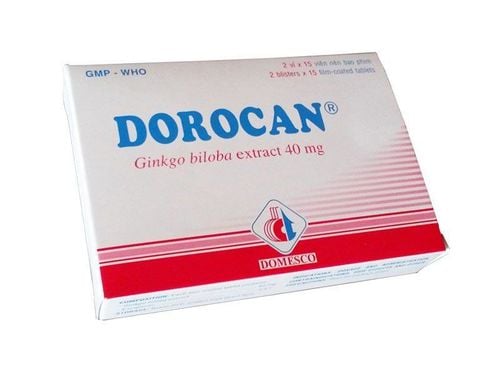This is an automatically translated article.
What is Medotam 400, is it a psychotropic drug? With the main ingredient of Piracetam, Medotam 400 is used in the treatment of symptoms related to encephalopathy and neuropathy such as dizziness, headache, cognitive decline, ...
1. What is Medotam 400?
Medotam 400 belongs to the group of psychotropic drugs, the main ingredient is Piracetam 400mg. For the nervous system, the active ingredient Piracetam has the effect of regulating neurotransmitters and helping to restore the function of nerve receptors. For blood vessels, the active ingredient Piracetam has the effect of increasing the deformability of red blood cells, reducing platelet aggregation and red blood cell adhesion, helping to reduce capillary spasm.
Medotam drug is made in the form of capsules and is indicated for use in the following cases:
Pathologies of brain damage, brain injury, after brain surgery, including ischemia, stroke, hemiplegia people, psychotic. Symptoms of peripheral and central brain disorders such as headache, dizziness, severe delirium. Symptoms of brain disorders such as impaired consciousness, senility, coma. In addition, Medotam is also used in the treatment of cerebrovascular accident, cerebral sequelae, carbon monoxide poisoning, chronic sensory impairment and cognitive decline in the elderly, people with myoclonic tremor, alcoholism. chronic, children with learning difficulties.
2. How to use and dose Medotam 400
Medotam is used orally, take the whole pill with water, can take it on an empty stomach or full. When taking, care should be taken not to break the tablet, not to remove the outer capsule shell to use the powder inside.
Specific Medotam dosage is as follows:
Usual dose: 30 - 160mg/kg body weight/day, divided the total dose into 2, 3 or 4 times for daily use. Long-term treatment of psychotic disorders in the elderly: 1.2 - 2.4g/day, in the first weeks the dose can be increased to 4.8g/day. Treatment of alcoholism: 12g/day during the first period of alcohol withdrawal. Usable maintenance dose is 2.4g/day. Treatment of cognitive impairment due to brain injury: The recommended initial dose of Medotam is 9-12g/day. The maintenance dose that can be used is 2.4g/day and the minimum duration of treatment is 3 weeks. Treatment of sickle cell anemia: 160mg/kg body weight/day, divided the total dose into 4 times to use during the day. Treatment of myoclonus: 7.2g/day, divided the total dose into 2-3 times to use during the day. Dosage of Medotam can be increased by 4.8g/day after each course of 3-4 days depending on the patient's ability to respond, however, the maximum dose should not exceed 20g/day. Treatment of dyslexia in children: The average dose is 50mg/kg body weight/day. Children can take medication throughout the learning process. Medotam overdose has not been recorded, even at high doses, the drug still does not cause toxicity.
3. Side effects of Medotam 400
Medotam drug can cause some unwanted side effects with the frequency of occurrence as follows:
About 5% of patients taking the drug (mainly in the elderly and using doses above 2.4g/day): sleep disturbance, restlessness, anxiety, depression, excitability, irritability,... When the dose of Medotam is reduced, these symptoms can be relieved. About 2% of patients taking the drug (mainly for the digestive system): Gastrointestinal disturbances, nausea, vomiting, diarrhea. Rare: Headache, dizziness, somnolence, fatigue. If you see any strange symptoms after taking Medotam, the patient should immediately report to the doctor and soon go to the medical facility for a health check.
4. Some notes when using Medotam 400
Do not use Medotam in people with hypersensitivity to the ingredients of the drug, people with severe kidney failure, pregnant or lactating women. Patients with mild to moderate renal impairment should be cautious when using Medotam, the dose should be adjusted in accordance with the creatinine clearance. During the course of taking the drug, the patient should not suddenly stop taking Medotam, but must reduce the dose gradually. Concomitant use of Medotam with Triiodothyronine T3, Tetraiodothyronine T4 may increase the risk of unwanted side effects such as sleep disturbances, irritability, and confusion. Patients who are taking the anticoagulant Warfarin when starting Medotam may prolong the prothrombin time. The use of Medotam is to act on transmitters and nerve cells, so that the drug has the effect of reducing the symptoms of brain damage such as cerebral hemorrhage, brain injury,... prescription drugs, so patients do not arbitrarily use without a doctor's prescription.












